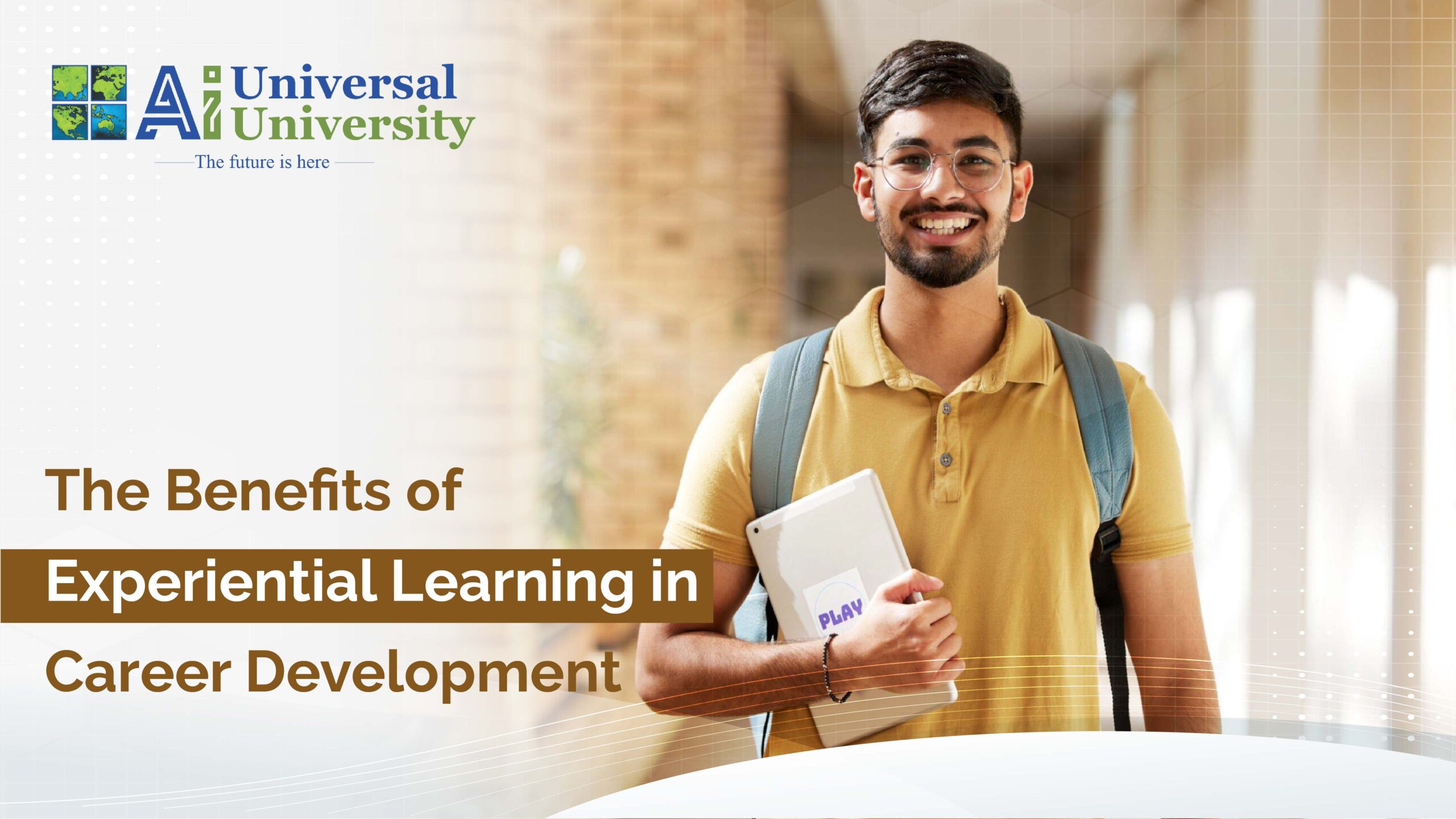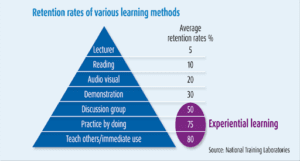
- September 18, 2023
- Artificial Intelligence, Experiential learning
Today’s world has progressed in all possible aspects including the educational facet. The concept of education has now converged into the process of experiential learning. Making a full stop to traditional classroom learning and welcoming experiential learning is all the current generation’s minds do. This is because experiential learning provides the capability to captivate concepts with real-time experience.
Universal AI University is a pioneer in providing experiential learning as we are one of the few top colleges that neglected traditional education over real-time learning.
Let this article provide a clear view of what experiential learning is and its benefits.
What is experiential learning?
Experiential learning is the new age educational strategy implemented to engage students in active learning and to provide them with real-time experience for a better conceptual understanding of any learning facet.
The literal experiential learning meaning is to learn anything by practising it rather than just bookish reading.
Experiential learning methods:
Experiential learning is made possible by a wide range of methodologies and techniques that holds the strength to install the concepts deep into the learning mind.
Let us explore the range of experiential learning methods:
Project-based learning:
Project-based learning is the prominent experiential learning method implemented in most top education institutions such as ours Universal AI University.
In this method, students are indulged in doing projects related to any particular concept wherein the students will have to research and come up with a suitable project outcome. Doing so will guide the students in learning experientially.
Game-based learning:
Game-based learning is an easy-to-learn experiential teaching method wherein students are indulged in playing conceptual games and simulation which help them know the concept, analyse, understand and ideate.
This experiential learning technique stimulates students to think forward and ideate out of the concept which is a very required aspect in the real-time world.
Adventure-based learning:
Adventure-based learning is an experiential learning strategy where the students are directly involved in real-time learning practices such as industrial visits, implant training, outdoor education activities, group task-completing activities, etc.
This learning strategy is considered to be the best experiential training strategy as it holds an opportunity for the student to enjoy the process of learning along with adventure.
It is also known that each experiential learning method holds different retention rates and memory rate and here is an idea about it:
Examples of experiential learning:
Some of the significant experiential learning examples for higher education are as follows:
- Making industrial visits to your relevant discipline and observing real-time working the industrial system.
- Making systemic projects based on the given concept and demonstrating the output.
- Seminar sessions are handled by students for their co-students.
- Group discussions on a particular topic and relating it with recent advancements with evidence.
- Case studies and problem-solving sessions to understand the concept and implement it.
Range of benefits of experiential learning in career development:
Student experiential learning has a great impact on career development as it holds a wide range of benefits and some of which are as follows:
Practical skill development:
The main agenda behind experiential learning is practical skill development. This practical skill development is a great fortune for better career development.
Students instead of studying the required skills, acquire and develop the skills practically via experiential learning.
Students get to earn real-time skills such as interpersonal skills, communication skills, management skills, etc.
Real-World Application:
Real-world application knowledge is considered to be one of the primary aspects of any chosen industry and this knowledge is inculcated in students by experiential learning.
Unlike traditional classroom learning, experiential learning provides an opportunity to engage students in real-world settings and implement theoretical knowledge. Doing so will enhance understanding and retention of concepts while creating a connection between theory and practice.
Enhanced Problem-Solving:
Experiential learning provides hands-on experience sessions that involve encountering challenges and obstacles. As a result, individuals learn to analyse problems, think creatively, and develop effective solutions, which are valuable skills in any career.
Improved Decision-Making:
Decision-making skills are considered highly important for high-rank career positions in all sorts of industries and experiential learning develops this skill.
Experiential training encourages individuals to make decisions in real-time, based on the information available and the context of the situation. This fosters improved decision-making abilities and the confidence to make sound judgments.
Networking Opportunities:
Experiential learning often involves interacting with professionals, mentors, peers, and potential employers. These interactions can lead to valuable networking opportunities, which are crucial for career development.
Personal Growth:
Experiential learning exposes students to a great range of experiences and facing new experiences and challenges can lead to personal growth and increased self-awareness. Individuals develop a better understanding of their strengths, weaknesses, and areas for improvement, leading to increased self-confidence and a stronger sense of identity.
Now, let us know how Universal AI University provides experiential learning for students.
Experiential learning at Universal AI University:
Universal AI University, one of the top educational colleges in India provide remarkable experiential learning to students in the following ways:
- Industrial visits
- Internship training
- Interactive sessions with renowned professionals in the industry.
As a whole, 15+ experiential learning practices are incorporated at Universal AI University to provide notable career development for students.
Conclusion:
Finally words here, experiential learning plays a pivotal role in career development by equipping individuals with practical skills, enhancing problem-solving abilities, fostering personal growth, and promoting adaptability. Its emphasis on real-world application, combined with the opportunity for networking and skill demonstration, makes it a powerful approach to preparing for and thriving in the professional world.
FAQs:
- What are the benefits of experiential learning?
Experiential learning holds a great range of benefits such as skill development, practical knowledge, real-world understanding, networking opportunities, etc.
- What are the benefits of active experimentation?
The benefits of active experimentation are as follows:
- Real-time learning
- Infused conceptual understanding
- High retention rate
- What are the features of experiential learning?
The best features of experiential learning are:
- Retention building capacity
- In-depth conceptual learning
- Hands-on training
- What is the difference between classroom and experiential learning?
Classroom learning involves indoor traditional learning practices whereas experiential learning involves engaged modern real-time learning practices.





